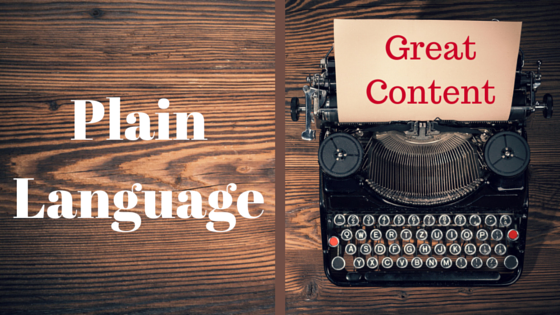Simple is Better: How plain language benefits your content
OK, so I’m pretty new to content marketing. As of this week, I’ve got a little over one full month of on-the-job experience under my belt, and I’m well aware that I have a long way to go before I can declare myself an actual content marketer. I’ll get there, just bear with me for now.
Like any form of writing, inbound marketing has its own unique flare about it. I’ve found it to be sort of like personal gonfiabili sportivi blogging, but on a professional platform. You pick and choose which topics really interest you, and write about why other people should care about them, too. So, my first impression of inbound marketing is teaching the world about the things you enjoy, which is pretty damn cool.
What’s not cool is writing that’s impossible to understand. It does no one any good to complicate your writing with obnoxiously formal grammar and unnecessarily technical language.
The last thing you want is for your message to fly straight over a reader’s head because your language was just too difficult to understand.
Think about this for a moment: according to a study by Dr. Carmen Simon, people forget 90 percent of content shared with them. Ninety percent. That’s a lot! So, when you’re fighting for a piece of that available 10 percent, you must have memorable content.
Regardless of what you’re writing about, it’s critical your writing doesn’t get in the way.
And yet there are still those who insist on using big words and fancy diction, all at the expense of readership. There are a million reasons why simple writing is better writing, but I’ll narrow it down to just three.
1. Plain language is inclusive
There is nothing worse than showing up to a party and not knowing anyone there. That’s how people feel when they read something filled with unfamiliar language. Whether it’s medical jargon or legalese or sport-specific language, no one likes being out of the loop.
As writers, sometimes we forget that not everyone understands our content quite like we do. When people don’t understand what they’re reading, they’re immediately alienated from the conversation—and you lose a reader. Your goal is to educate your readers and establish yourself as the go-to resource for knowledge on a particular topic. You can’t do that if you’re speaking a language only a few can decipher.
Ask yourself if a 12-year-old could comprehend what you’re saying. If not, you need to reword some things. I realize that last bit may sound strange. You shouldn’t have to dumb down your writing so a kid could understand it, right? Yes, actually, you should.
And you’re not “dumbing down” your writing at all. You’re cleaning it up; you’re using language as efficiently as possible. Simple does not equal stupid.
2. Plain language is a hard skill to master.
What makes plain language so difficult to master is that cutting out excessive words means you have to be good at choosing the best ones. This isn’t something you’ll get right on the first try – no one does – but it’s a good habit to get into. Being able to write as concisely and clearly as possible is a skill to be proud of; you’re a better writer for it.
I use excessive language constantly, much to my disappointment. I find myself wanting to buff up my writing with bigger words and complex sentence structure because I think it sounds more official. It doesn’t. It only confuses the message.
A skilled writer utilizes uses only the words needed necessary words and nothing more.
3. Plain language is clear language.
There are many subjects people dread reading about because they’re too convoluted. However, no matter the subject, no one will ever complain that you made it too easy to understand.
Your job as a content marketer is to provide valuable information and to deliver that information in a way that is easily understood and digested. A misunderstood message means you aren’t doing your job well.
Decades of suffering through undecipherable government, insurance and legal documents have given way to a plain language movement, the history of which is explained by Reputation Ink’s own boss lady.
Most recently, President Obama signed the Plain Writing Act of 2010, which requires the federal government to write documents in plain language. If the government can do it, so can you. After all, you didn’t shut down your business for two weeks when things got tough, now did you?
Some helpful tips for clear writing
Recently, at INBOUND15, which the Reputation Ink team was privileged to attend, HubSpot’s own Beth Dunn gave a presentation on how to use your words effectively. As Dunn says, “every word is a brushstroke in the self-portrait you present to the world.” #QuoteOfTheDay
I’ve picked out three tips from her presentation that apply directly to plain-language writing.
1. Use small words
Simpler words are always a better choice. Try to match your writing as closely as possible to natural conversation, without the ‘um’s and ‘uhh’s, of course.
- Use not utilize
- Part not component
- Quick not expeditious
2. Avoid jargon
Jargon is alienating to most audiences. Avoid it completely and instead use more accessible alternatives. Your writing should be helpful, so define acronyms, spell out definitions of unfamiliar terms, and translate complex language into something easily understood.
3. Edit, edit, edit
You’ve heard it before, and I’ll say it again: editing is the not-so-secret secret to quality writing. Don’t try to edit as you write; hammer out what Ann Handley calls the Ugly First Draft, then go back and simplify. Style guides are helpful for questions on phrasing or punctuation.
And don’t be afraid to have someone else edit your work. They will always see something you’re blind to in your own work.
Do you have tips on how to write clearly?












